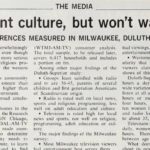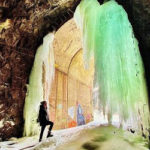Proving I am who I say I am
While I often avoid politics in my public writings, I want to take a few minutes to explain the life of someone different from most people, in a small way, that may reveal the complexities of some recent legislation proposed at the federal level.
My mother corresponded, as many high school girls did in the 1970s, with GIs stationed overseas. Lots of high schoolers sent letters to GIs; very few GIs wrote back, but my father did. After a few letters exchanged, he spent his leave flying to Milwaukee, where he proposed to my mother.
Their marriage helped my father become stationed in Europe while most of his contemporaries were being sent to Vietnam. My mother saw Rome and Germany and, oh my, while they were stationed in Stuttgart she learned she was pregnant.
Some months later, my mother gave birth to me. I am a natural born American, with citizenship rights at birth, without a birth certificate. I am one of three million people like this in the United States.
At several times in life, I have been asked to produce a birth certificate. I bring my “report of birth” form with me, a half-sheet of typing paper with exceptionally basic information about my birth on it. That is, every time I need to produce a birth certificate, I produce a piece of paper that few people have ever seen before.
That piece of paper is fifty years old. I cannot imagine there is a way to produce a new copy. There are ways to request birth certificates, and the federal government can help you request consular reports, but I have no faith in the government to have retained a record from an embassy in Germany more than fifty years ago. You might think that the Army would have retained a record, but my father was enlisted as “David Smith.” It wasn’t until after he met my mother than he realized his stepfather never adopted him, and his legal, real name was “David Beard.” So requesting information about my father’s time in the service also has complications.
But, I am white and male, and in any conversation where my identity is in question, there is a halo that makes people tend to give me the benefit of the doubt. And I am persistent, with time and resources to navigate the systems that ask me to produce proof I am who I say I am, so I manage. When I need to prove I am who I say I am, now, I pull out my passport, and it works without question. I hope never to lose it.
Other people live lives in which picture ID isn’t useful. Seniors living in assisted living without a need to drive have no need for ID. In most everyday contexts, they are recognized as who they are, without ID. They are driven by friends or by transit services for the elderly. If they drink, they are so clearly over 21 their ID is rarely checked. Getting one now, to vote, would be an inconvenience or worse.
If you believe that IDs are easy to get, you just haven’t met enough other people. Once you meet enough other people, you realize that it’s not that easy.
If you are someone who thinks we need stricter identification rules for voting in the next election, you just haven’t met enough people to know how many you’d be creating a barrier for. That’s a barrier between the exercise of their rights and them. Recent proposals to mandate ID standards for voting will make people like me, but without my persistence, resources, and privilege, stop when they see that barrier rise up in the distance.
Recommended Links:
Leave a Comment
Only registered members can post a comment , Login / Register Here














No Comments